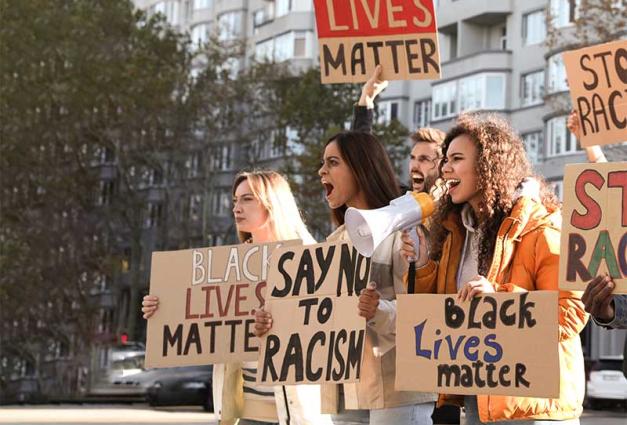#BlackLivesMatter. #MeToo. In recent years, members of many historically disadvantaged groups have been taking to social media, and the streets, to call out the bias they have faced. Although it takes many forms, this activism typically involves members of non-dominant groups (those relatively disadvantaged in society) charging members of dominant groups (those relatively advantaged) with discrimination. An important question emerging from the protests is, "How do members of dominant groups react when accused of prejudice?"
Although some members of dominant groups respond to protests against them with apology and allyship, it's not uncommon for others to try to dodge accountability. In some instances, members of dominant groups accused of bias even try to claim that they're the real victims. In our research, we tried to understand how people feel about this phenomenon, and when they may even support members of dominant groups responding to accusations of discrimination with claims that they are the true victims.
We examined how people respond to two different types of victimhood claimed by members of dominant groups. The first can be called "competitive victimhood." Groups engage in competitive victimhood when they claim that an opposing group harms them more than they harm the other group. Competitive victimhood claims are common because when we identify our group as a victim, we grant ourselves moral standing and license our group to act in its own self-interest. One example can be seen in common arguments from White nationalists who, when accused of racial discrimination against non-Whites, try to frame the accusation as an instance of anti-White discrimination.
The second type of victimhood claiming we examined is one we termed "digressive victimhood." In digressive victimhood, members of dominant groups not only claim victimhood (like in competitive victimhood), but they also try to shift the topic of conversation at the same time. For example, in the 2018 Masterpiece Cakeshop v. Colorado Civil Rights Commission Supreme Court Case, Christian Americans responded to accusations that the bakers were discriminating against LGBTQ people by refusing to make their wedding cake, with claims that the bakers were, in fact, the victims, and that the real issue at play was religious liberty. Digressive victimhood claims thus have two goals: to achieve competitive victimhood (boost the dominant group's moral standing), and also to change the topic of debate from discrimination to something different.
What Do People Think About These Claims?
We explored how people respond to digressive and competitive victimhood claims coming from members of dominant groups. In our first study, Christian Americans read one of two op-eds. In one, a fellow Christian American argued that, in response to accusations of discrimination from members of the LGBT community, it is really Christian Americans who are being threatened (competitive victimhood). In the other, the op-ed writer argued that Christian Americans' religious liberty is being threatened (digressive victimhood).
In our second and third studies, White Americans listened to a podcast clip in which another White American argued that, in response to accusations of discrimination from people of color, either White Americans are threatened (competitive victimhood) or White Americans' freedom of speech is threatened (digressive victimhood).
Consistently, our participants more strongly agreed with, and supported, digressive victimhood claims over conventional competitive victimhood claims. Also, they reported that, by appealing to abstract principles like free speech or religious liberty, the digressive victimhood would be more effective than the competitive victimhood claims at preventing further criticism from the non-dominant group. This belief that the digressive victimhood claim would be effective in silencing critics was one of the primary reasons for supporting these claims.
In the third study, non-dominant (non-White) participants also read these claims and told us what they thought. They also endorsed digressive victimhood claims more strongly than competitive victimhood claims, but they did so to a much smaller extent than members of dominant groups did. Importantly, members of non-dominant groups didn't share the belief that digressive victimhood claims are better at shutting down further criticism of the dominant group.
We wondered if supporting digressive victimhood claims is mainly just a cynical attempt to silence critics. To test this, we examined whether members of dominant groups needed a sincere belief in the core arguments of the claim in order to support them. Indeed, in Study 2, White Americans high in racial resentment were willing to endorse the digressive victimhood claim even if they didn't strongly believe in freedom of speech. This lends further support to the idea that members of dominant groups see digressive victimhood claims as an effective way to avoid further criticism of their group.
This work has important implications for how we navigate an increasingly diverse society. Members of dominant groups may use digressive victimhood claims to avoid accountability for their own discriminatory behavior. When members of non-dominant groups speak up about the bias they face, everyone should be aware that some people may try to derail this conversation. If we want to progress toward a more equitable society, we should be wary of these distractions.
For Further Reading
Danbold, F., Onyeador, I. N., & Unzueta, M. M. (2022). Dominant groups support digressive victimhood claims to counter accusations of discrimination. Journal of Experimental Social Psychology, 98, 104233, https://doi.org/10.1016/j.jesp.2021.104233
Felix Danbold is an assistant professor at University College London School of Management. He studies resistance to growing diversity in society and organizations.
Ivuoma N. Onyeador is an assistant professor at the Kellogg School of Management at Northwestern University. She studies how dominant and non-dominant group members reason about group-based discrimination and disparities.
Miguel M. Unzueta is a professor at UCLA Anderson School of Management. He studies how people define diversity and the consequences of these definitions for racial equity in organizations.



